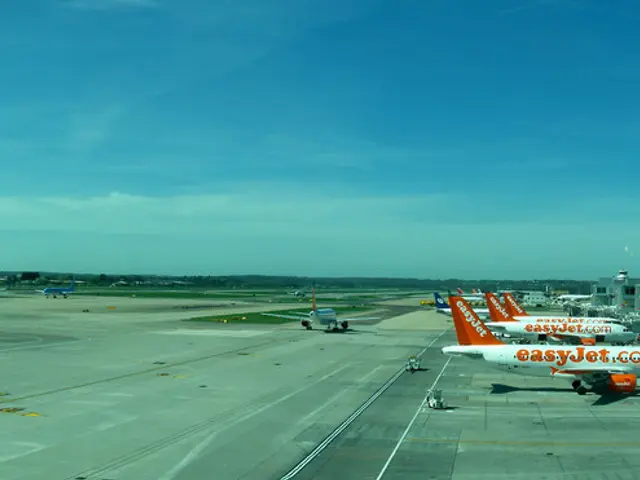Transit authority tightens fare-evasion measures sparks backlash among free-transport supporters
Challenges of Strict Fare Enforcement for Low-Income Transit Users in Ottawa:
In the bustling city of Ottawa, a heated debate surrounds the recent crackdown on riders who skimp on bus or LRT fares. An Ottawa advocate for free transit claims this strict enforcement unfairly punishes low-income folks who can't afford to use the troublesome transit system.
Recent reports to the transit committee from OC Transpo reveal fare evasion levels and their enforcement strategies. The transit service employs 12 fare enforcement officers, with $260 as the hefty fine for evading payment. A staggering 4,300 tickets were slapped on bus-riders and stations in 2024. About 30% of the tickets were paid promptly, 11% faced additional penalties, with the remaining 59% leaving the bill unpaid. As of now, these payments have generated over $350,000 in revenue.
"Fare revenue is a crucial component of the funding model for transit in Ottawa," the report states. "Fare enforcement ensures the integrity of the fare system and guarantees an equitable experience for all transit customers."
With a $120 million budget shortfall looming in 2025, OC Transpo plans to ramp up its measures against fare evasion. In 2025, the service expects enforcement fines to bring in over $1 million. The budget for fare enforcement, intended to deter violators and boost system security, stands at a mere $1.25 million in 2025.
Stittsville Coun. Glen Gower, chair of the transit committee, explained the measure was inspired by concerns and feedback shared by bus operators and drivers, who feel alarmed by the number of violations they witness.
"We're determined to guarantee that folks pay the transit fare when boarding a bus or hopping on the train." Gower said.
However, Marie Nigro from Free Transit Ottawa claims that the reluctance to pay for fares among Ottawans may stem from repeated service cuts. On April 27, OC Transpo will axe 27 bus routes, with 15 being replaced. This restructuring is a part of the agency's "A New Way to Bus" network, promising more frequent service in neighborhoods and stronger links to LRT stations.
"Riders are likely just feeling used, and fares keep rising while the services are shrinking." Nigro stated.Nigro points out that those experiencing financial hardships are the ones more likely to avoid paying transit fees. Moreover, she argues that the penalty for non-payment is "extremely steep."
"If you can't afford $4, you certainly can't pay over $200." Nigro said.
Nigro shares the opinion that if Ottawa wants transit use to increase and fare dodging to decrease, they should foster a transit system that residents can take pride in.
"If they intend to keep the fare system, they need to make it worthwhile for the riders, convincing them that this is something they should pay for. Also, do more consultations with the public." Nigro advised.
Ushering in positive change, Free Transit Ottawa is a coalition of environmental and social justice activists striving to combat climate change and promote social justice by making public transit free for all. They propose financing public transit via progressive taxes, similar to the way public education, medical care, fire services, roads, and sidewalks are provided.
For individuals who may struggle to pay the transit fare, Gower confirms that the city provides several reduced-fare programs to cater to low-income folks. These programs include U-Pass partnerships with local universities, EquiPass, community and access passes, as well as complimentary transit for newcomers and refugees settling in Ottawa.
Ana Clara Miranda Guimaraes, vice-president of research and advocacy with the Carleton University Students' Association, echoes the urgent need to address students' transit issues. Last fall, OC Transpo proposed hiking university transit fares by 5%, a measure that, while ultimately not implemented, would have increased fare evasion among students.
Navigating the cost-of-living crisis, Guimaraes underscores the importance of making transit affordable for students. "If students are already paying through the roof for housing, education, and transit fares, it's only a matter of time until they stop respecting those fares, because it's simply not feasible." said Guimaraes.
Lastly, Gower stresses fare inspectors' discretion when deciding whether to hand out a ticket or warning. He also emphasizes the safety benefits of increased fare enforcement personnel, as they not only tackle fare violations but also extend support and safety assistance to passengers.
"It's essential to have extra staff around—not just for fare tracking, but for customer and safety support," Gower commented. "In fact, they've even stepped in to help folks experiencing overdoses and other emergencies."
Deeper Insight:
The harsh ramifications of increased fare enforcement on low-income transit users in Ottawa warrant closer examination, given that these measures perpetuate the challenges faced by vulnerable populations.
- Homelessness and Poverty: Ottawa grapples with rising homelessness and poverty, affecting over 3,000 residents, with a 13% increase since 2021[5]. The crackdown on fare evasion could worsen their economic struggles.
- Lack of Food Security: One in four households confronts food insecurity in Ottawa, further straining the finances of low-income families[5]. In this economic climate, increasing transit fares seems counterproductive.
- Alternative Solutions: Critics advocate for more inclusive strategies, such as providing a more affordable transit system, introducing bulk payment options, or even proposing free transit, to help ease the financial strain on those who can least afford it.
- Consulting the Community: Cultivating an open dialogue with residents can help identify the root causes of fare evasion and create tailored, compassionate solutions to better the transit experience for all.
- The controversy in Ottawa revolves around the strict enforcement of transit fares, with critics arguing it unfairly affects low-income individuals.
- Reports reveal that fare evasion is a significant issue for OC Transpo, with $260 fines for evading payment, and over $350,000 generated from unpaid fines in 2024.
- As OC Transpo faces a budget shortfall in 2025, they plan to enhance enforcement measures against fare evasion, aiming to generate over $1 million in revenue.
- Environmental and social justice activists, such as Free Transit Ottawa, propose financing public transit through progressive taxes, similar to how education and medical care are provided.
- The city offers reduced-fare programs for low-income residents, including U-Pass partnerships, EquiPass, community and access passes, and complimentary transit for newcomers and refugees.
- A coalition of activists argues that increased transit fares can lead to fare evasion among students, contributing to the cost-of-living crisis they face in areas like housing and education.
- The harsh consequences of increased fare enforcement could exacerbate challenges faced by vulnerable populations, such as rising homelessness and food insecurity in Ottawa.
- Critics suggest more affordable transit options, bulk payment choices, or even free transit to help alleviate the financial burden on low-income riders.
- Engaging in community discussions can help identify the causes of fare evasion and create thoughtful, compassionate solutions to enhance the transit experience for all residents.








